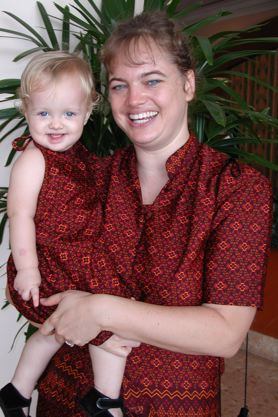Travel Tips
Grateful Traveler: Gifts That Keep on Giving
 If, as Carole King wrote, life is a tapestry of rich and royal hue, then Kristi Zabriskie’s life is woven from 10,000 strands.
If, as Carole King wrote, life is a tapestry of rich and royal hue, then Kristi Zabriskie’s life is woven from 10,000 strands.
You might say the warp* was set when, because of her father’s ministry, Kristi was raised among Zuni, Navajo and other Indian peoples.
“My love of native artwork was nurtured at a young age and had a strong influence on my view of handcrafts,” says Kristi.
The threads of weft* that brought to her life “a wondrous woven magic” were provided compliments of the people of Cambodia and Vietnam.
*Warp – the lengthwise loom threads that form the basis for a tapestry.
*Weft – the threads drawn under and over warp threads to craft the tapestry.
The outline of the tapestry began to take shape when Kristi and her husband visited Vietnam a few years ago. Like most visitors to that nation, Kristi was struck by the kindness of the people and the beauty of the country.
But what she could not shake from her mind, what stayed with her for months after her return home, was the memory of a place where so many things were made right in front of her. “You could go into a shop, pick out a piece of silk fabric, then watch as one person cut it and another person sewed it,” remembers Kristi. “Whole sections of towns were dedicated to people plying their crafts. Everything was handmade and beautiful.”
When she returned to California, Kristi began to wonder about the stores where she bought her own clothes. “I’d heard about sweat shops but I’d never really thought about what I was wearing or using or what the life of the person who’d made it was like,” says Kristi. She began to question store managers about where their goods came from, but no one seemed to know or care about the places or people who’d made the merchandise.
Then Kristi, her husband and their five-month-old daughter moved to Cambodia. “It’s such an incredible place,” says Kristi, “a beautiful country filled with beautiful people. But the suffering caused by poverty and their brutal history is palpable. It hangs heavy in the air.”
To help her move beyond her feelings of despair, Kristi started working at a Trauma Recovery Center for girls who had been sexually exploited. And that first Christmas she made sure to buy all her presents from fair-trade co-ops that provided orphans, the disabled, the elderly, and girls like the ones with whom she was working with a livelihood.
“I was so thrilled to know that every present I gave was not only unique and beautiful, but by buying it, I had helped to improve someone’s life,” says Kristi.
 The tapestry had begun to come together, but here is where the story takes that strange, meant-to-be, Eskimo-style twist.
The tapestry had begun to come together, but here is where the story takes that strange, meant-to-be, Eskimo-style twist.
Although she was the daughter of a Christian Reform minister, Kristi decided to join the Mennonite church. And the Mennonites just happen to have started a chain of stores dedicated to selling fair-trade items.
Called 10,000 Villages, the stores were filled with exquisite textiles, crafts, jewelry and house wares from around the globe—the very kinds of things Kristi had been bringing back from Cambodia and Vietnam. Today, 10,000 Villages outlets are no longer officially affiliated with the Mennonite Church, but they remain non-profits, staffed mainly by volunteers.
Because of her affiliation with the Mennonite church, Kristi knew of the stores, but had no intention of opening one. When she returned from Vietnam, she did contact them, but only to say, “Why don’t you have a store in Southern California?”
Their reply? “Because we were waiting for you to open it.”
Kristi had to laugh at that. She knew nothing of retail. Nothing of finances. Nothing of stocking or buying or displaying goods in a store. But not surprisingly for Eskimo lovers, all the right people showed up in her life to help her get the store off the ground.
So there it sits, a 10,000 Villages store on Lake Avenue in Pasadena, California. The merchandise is indeed exquisite and each handmade piece comes with a story: of families in Vietnam who now have dignity and money to send their children to school; of widows in Nigeria who make whimsical sculptures and jewelry out of old tin cans; of Guatemalan weavers and Indian carvers and African coffee growers.
And each time someone shops there, it gives another person in a country far away a chance to see his or her life improved.
As Kristi puts it, “It’s such a rewarding feeling to know that I am helping to bridge the distance between countries and people. A person coming into the shop might not know the story of the artists who made the crafts, but by the time they leave, they do.” Imagine this holiday giving gifts that make the world feel like 10,000 villages instead of countries with barriers and borders. Now that would be heaven on Earth.
By Jamie Simons for PeterGreenberg.com.
To shop online or to find the location of a 10,000 Villages store near you, visit www.tenthousandvillages.com.
Read more inspiring stories from the Grateful Traveler series:












